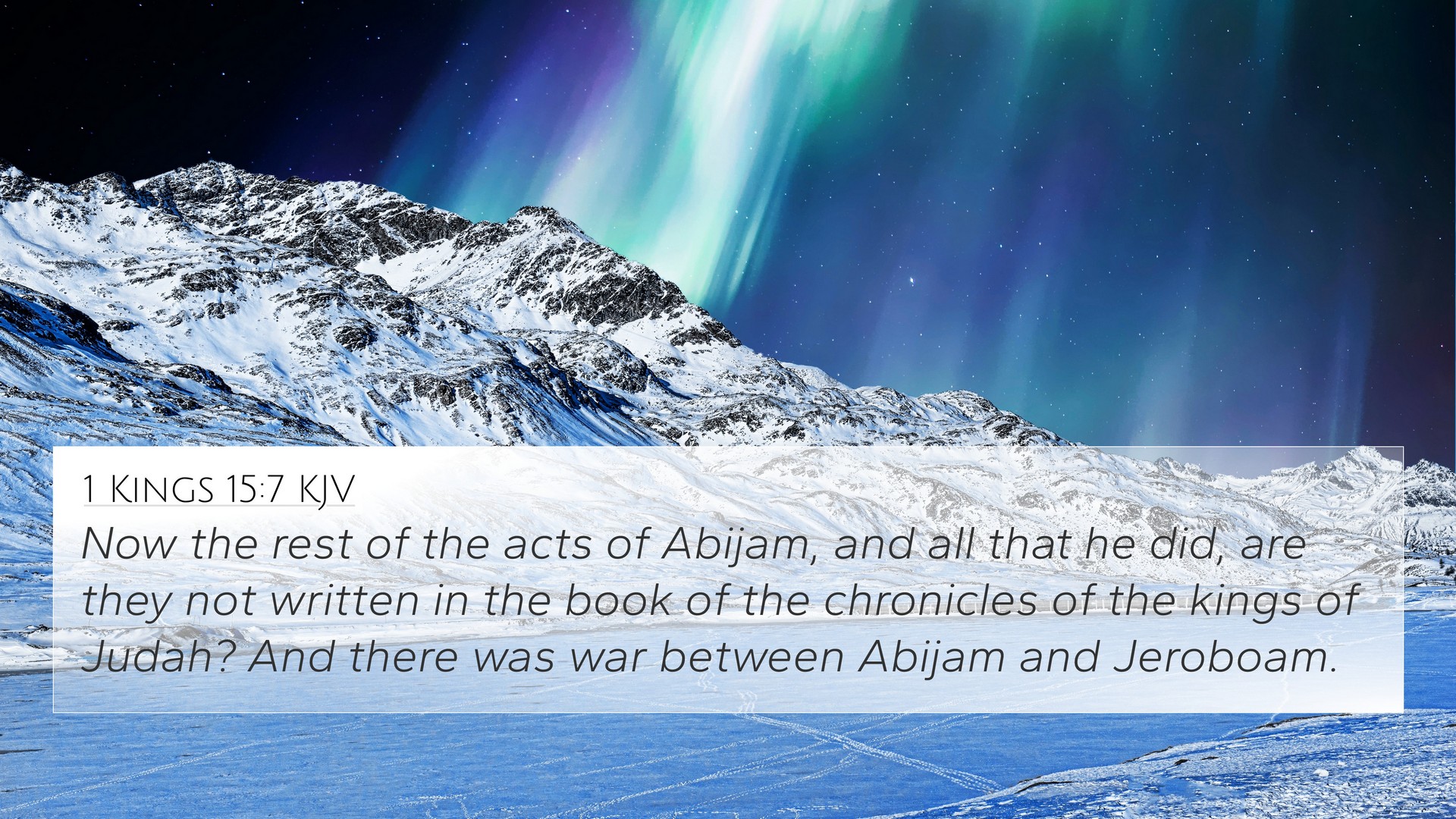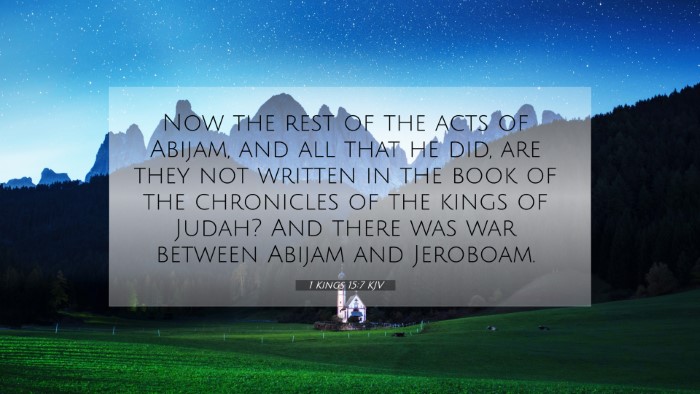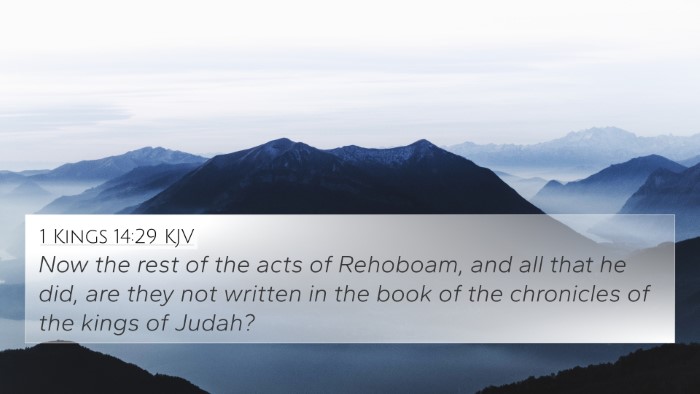Understanding 1 Kings 15:7
Verse Context: In this verse, we find a brief mention of Abijam's reign over Judah, specifically highlighting the legacy of his father, Rehoboam, and the consequences of his actions.
Verse Text: "Now the rest of the acts of Abijam, and all that he did, are they not written in the book of the chronicles of the kings of Judah? And there was war between Abijam and Jeroboam." (1 Kings 15:7, KJV)
Summary of Commentaries
This verse serves as a concise encapsulation of Abijam's reign and the ongoing conflict between the kingdoms of Judah and Israel. The reflections from various public domain commentaries highlight different aspects of this brief account.
Matthew Henry's Commentary Insights
Henry emphasizes the historical context of Abijam’s reign, suggesting that his actions were critical yet not extensively documented. He underscores the ongoing enmity between the Israelite tribes and Judah, which frames the political atmosphere of the time. Moreover, Henry points out the significance of the chronicler’s note about Abijam’s legacy, implying that the evaluation of a leader's reign in scripture often considers their spiritual fidelity and the repercussions of their decisions.
Albert Barnes' Commentary Insights
Barnes notes that the record in the chronicles may indicate a more detailed account of Abijam's life and actions, which are not explicitly stated here. He also comments on the perpetual warfare between Abijam and Jeroboam, which illustrates the strain and division within the nation of Israel. In addition, Barnes reflects on the notion of divine justice, as the conflicts stem partly from the spiritual failures of previous kings and the people's disobedience.
Adam Clarke's Commentary Insights
Clarke places focus on the significance of the "book of the chronicles" as a source for understanding the kings of Judah, emphasizing the importance of historical records in capturing the essence of leadership. He explores the consequences of Abijam's decisions, and how they influenced future generations. Clarke addresses the ongoing conflict, positing that it serves as a reminder of the divisions within Israel and the consequences of straying from God's covenant.
Bible Verse Cross-References
1 Kings 15:7 connects to several other passages which shed light on similar themes of leadership, divine judgment, and national conflict:
- 1 Kings 14:29-31: Discusses the acts of Rehoboam, Abijam's father, offering context on the legacy passed down.
- 2 Chronicles 13:1-2: Provides a more detailed account of Abijam’s reign and his battle against Jeroboam.
- 1 Kings 12:16-20: Chronicles the division of the kingdom and sets the stage for the hostility between Judah and Israel.
- 2 Chronicles 10:16-19: Further elaborates on the discontent among the tribes leading to the separation from Judah.
- 1 Kings 15:6: Connects directly to the legacy of Rehoboam and the strained relations during Abijam’s time.
- 1 Kings 14:30: Highlights the continuous warfare between Israel and Judah, hinting at divine judgment.
- 1 Kings 15:8: Continuation of the narrative regarding Abijam, further emphasizing historical evaluation.
Connections Between Bible Verses
The analysis of 1 Kings 15:7 indicates how themes of leadership struggle, covenant faithfulness, and divine judgment are interwoven throughout the scripture. This verse serves as a pivotal point linking historical accounts, particularly regarding the division of the united monarchy of Israel and Judah. It highlights the question of a godly legacy versus a legacy of conflict.
Thematic Bible Verse Connections
As we delve deeper into the connections between Bible verses, we can see;
- The peace and conflict dynamics between neighboring nations, reflective of spiritual fidelity.
- The impacts of cultural and political decisions on subsequent generations.
- The ongoing calls for repentance and return to God amidst Israel’s leadership struggles.
Comparative Bible Verse Analysis
When examining 1 Kings 15:7 in light of other scriptures, one can explore:
- How the actions of Abijam parallel or contrast with that of later kings such as Asa and Jehoshaphat.
- The patterns of sin and their results as shown in the entirety of the history of Israel and Judah.
Bible Cross-Reference Guide
Using tools for Bible cross-referencing, one can explore these intricate relationships and themes. The use of a Bible concordance or cross-reference system aids in locating similar verses and understanding the broader narrative God communicates through scripture. This approach enriches Bible study, allowing for a more comprehensive study of scriptural parallels.
Conclusion
1 Kings 15:7 serves not only as a record of a king’s reign but also as a reminder of the importance of faithfulness to God amidst the trials and conflicts of leadership. By engaging in cross-referencing biblical texts, individuals can gain a deeper understanding of how historical and spiritual themes are interlinked throughout the scriptures, further enriching their biblical studies and spiritual growth.




